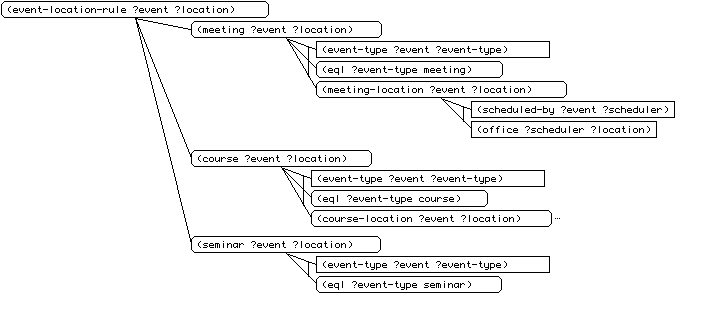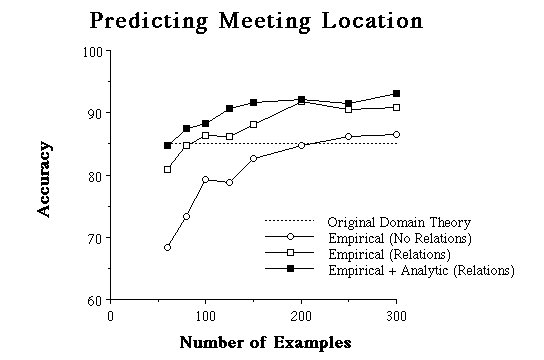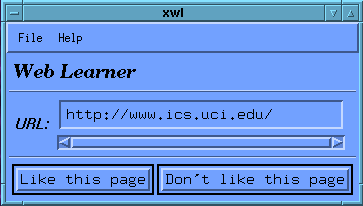The theory graphed below is a simple theory of how faculty schedule their meeting
locations. A person who schedules the meeting schedule it in his office, classes are held
in the classroom in which they are assigned, and seminars are held in seminar rooms.
 The theory isn't perfect, but it helps a FOCL learn to make more accurate predictions.
For example, one rule is changed by training on two faculty schedules to indicate that
faculty schedule meetings in their office if no more than two others attend.
The theory isn't perfect, but it helps a FOCL learn to make more accurate predictions.
For example, one rule is changed by training on two faculty schedules to indicate that
faculty schedule meetings in their office if no more than two others attend.
(event-location_learned_rule ?0 ?1) :-
(event-type ?0 ?2), (eql ?2 meeting), (scheduled-by ?0 ?3),
(office ?3 ?1), (number-of-attendees ?0 ?4), (<= ?4 2)
Comparison of Learning Methods
This graph shows the average accuracy of FOCL trying to predicting the location at which a meeting will be held under three conditions:- Empirical (No Relations). FOCL learns rules like a propositional learner. It doesn't use additional relations containing information on classroom or office locations
- Empirical (Relations) FOCL uses relations containing information on classroom or office locations to learn first-order rules.
- Empirical+ Analytic (Relations) FOCL uses relations containing information on classroom or office locations to learn first-order rules. In addition, FOCL is given an approximate theory that is about 85% accurate.

FOCL is more accurate when given useful background relations, and even more accurate when also given an approximate domain theory.
Existing Applications of FOCL
Application Rules Data Source Chess end games 10 1000 investigator Payment of student loans 20 1000 honors project Foreign trade negotiations 30 100 company (EBR) Aircraft Identification 35 100 company (Hughes) Telephone network 80 1000 company (NYNEX) Calendar management 7 500 CMU Translation (3000) 7200 company (NTT)
Work In Progress

I assume you are familiar with a Hot List that contains pointers to your favorite Web pages. We are working on an an extension to Mosaic that contains a Cold List with pointers to Web pages you've visited but didn't like. Here's why:
- Links on your cold list will be displayed in gray to warn you not to go there.
- We are building a learning program to analyze your Hot List and Cold List and to suggest new Web Pages that you'd be interested in.
Publications
Machine learning papers from UCIProject Leader: Michael Pazzani
Department of Information and Computer Science,
University of California, Irvine
Irvine, CA 92717-3425
pazzani@ics.uci.edu